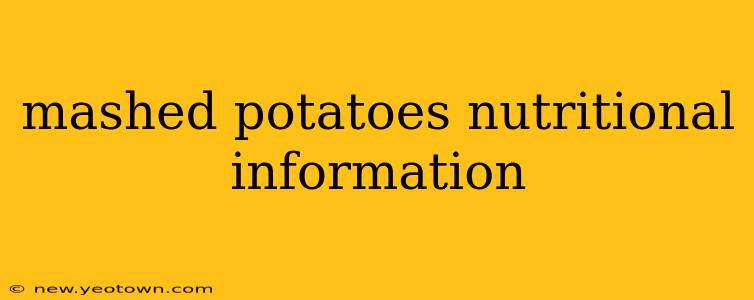Ah, mashed potatoes! The creamy, comforting side dish that graces countless tables worldwide. But beyond their deliciousness, what's the nutritional story behind this beloved classic? Let's peel back the layers (pun intended!) and explore the nutritional information of mashed potatoes, addressing some common questions along the way.
What are the macronutrients in mashed potatoes?
The macronutrient profile of mashed potatoes hinges heavily on the ingredients used and the preparation method. Let's take a look at a typical serving (about ½ cup) of mashed potatoes made from russet potatoes and a touch of milk and butter:
- Carbohydrates: This is where the bulk of the calories come from. Potatoes are primarily carbohydrates, providing energy for your body. Expect around 20-25 grams of carbs per serving.
- Protein: Mashed potatoes offer a modest amount of protein, typically around 2-3 grams per serving. This isn't their primary nutritional strength, but it contributes to overall satiety.
- Fat: The fat content largely depends on the additions. A simple recipe with a bit of milk and butter will contribute roughly 5-8 grams of fat. Adding extra butter, cream, or cheese dramatically increases this number.
How many calories are in a serving of mashed potatoes?
The caloric content is directly tied to the ingredients and portion size. A ½ cup serving of basic mashed potatoes, as described above, typically falls within the 100-150 calorie range. However, loading up on butter, cream, cheese, or bacon bits can quickly push this number well over 200 calories.
Are mashed potatoes healthy?
This is a question that demands a nuanced answer. Plain, simply mashed potatoes from scratch, made with minimal additions, are a decent source of potassium and vitamin C. However, the healthfulness of mashed potatoes is highly susceptible to how they're prepared. Adding excessive amounts of butter, cream, cheese, and other high-fat ingredients transforms them into a calorie-dense side with a considerably less healthy profile. The key to a healthier version is moderation and mindful ingredient choices. Consider using low-fat milk or alternatives, reducing butter, and exploring herbs and spices to enhance flavor.
What are the benefits of eating mashed potatoes?
While not a nutritional powerhouse, mashed potatoes do offer some benefits:
- Potassium: Potatoes are a good source of potassium, an essential mineral for maintaining healthy blood pressure.
- Vitamin C: They also contain Vitamin C, an antioxidant vital for immune function.
- Fiber (depending on preparation): Leaving the skins on during preparation can significantly increase the fiber content, promoting digestive health.
Are there any downsides to eating mashed potatoes?
The potential downsides are largely related to the preparation method:
- High calorie count (if prepared with high-fat ingredients): As mentioned, excessive additions of fats and cream can lead to a high calorie and fat intake.
- Glycemic index: Potatoes have a relatively high glycemic index, meaning they can cause a rapid spike in blood sugar. This is more pronounced in mashed potatoes than in whole potatoes due to the breakdown of the cell structure during mashing.
- Potential for added sodium: Many recipes include salt, which can be a concern for individuals watching their sodium intake.
How can I make healthier mashed potatoes?
The beauty of mashed potatoes is their adaptability. Here are a few tips to create a healthier version:
- Use low-fat milk or alternatives: Opt for skim milk, almond milk, or other low-fat options.
- Reduce butter: Use a minimal amount of butter or consider healthier substitutes like olive oil.
- Add herbs and spices: Enhance the flavor with herbs and spices instead of relying heavily on fats.
- Leave the skins on: This boosts the fiber content.
- Choose starchy potatoes: Russet potatoes are ideal for creamy mashed potatoes but other varieties work, too.
- Steam or bake your potatoes: Avoid boiling in excessive water to minimize nutrient loss.
In conclusion, mashed potatoes can be a part of a balanced diet, but mindful preparation is key. By choosing healthier ingredients and practicing moderation, you can enjoy this comforting classic without compromising your health goals. Remember, the best way to determine if mashed potatoes fit within your healthy eating plan is to consider the overall context of your diet.

